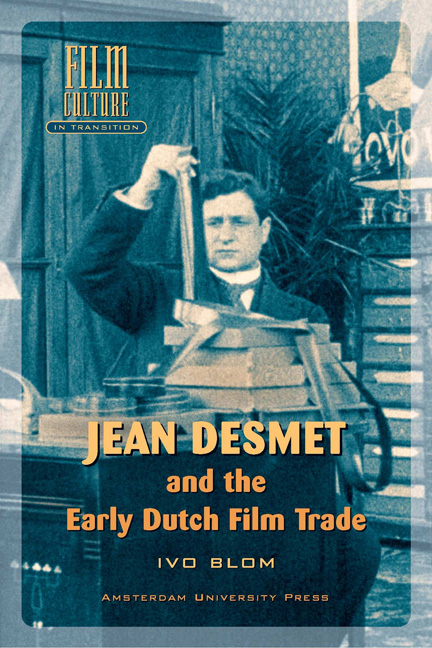Book contents
- Frontmatter
- Dedication
- Contents
- Preface
- Abbreviations, Unidentified Films and Historical Currencies
- Introduction
- I La Comète Belge: Jean Desmet’s Travelling Cinema, The Imperial Bio (1907-1910)
- II In The Beginning…: Film Distribution in the Netherlands Before Desmet
- III Gold Rush: In the Throes of Cinema Mania (1909-1914)
- IV Film Market Europe: Buying Films Abroad (1910-1914)
- V White Slave Girls and German Kultur: Film Rental and Distribution Strategies in the Netherlands (1910-1914)
- VI Onésime et Son Collègue: Competition (1910-1914)
- VII Das Ende vom Lied: The Impact of the First World War (1914-1916)
- VIII Quo Vadis?: Desmet’s Film Rental and Cinema Operation During the Great War (1914-1916)
- IX Afterlife: A New Career and the Beginning of a Collection
- X In Retrospect: Jean Desmet’s Place in Film History
- Notes
- Bibliography
- Photo Credits
- Film Culture in Transition
- Index of Film Titles
- General Index
II - In The Beginning…: Film Distribution in the Netherlands Before Desmet
Published online by Cambridge University Press: 14 January 2021
- Frontmatter
- Dedication
- Contents
- Preface
- Abbreviations, Unidentified Films and Historical Currencies
- Introduction
- I La Comète Belge: Jean Desmet’s Travelling Cinema, The Imperial Bio (1907-1910)
- II In The Beginning…: Film Distribution in the Netherlands Before Desmet
- III Gold Rush: In the Throes of Cinema Mania (1909-1914)
- IV Film Market Europe: Buying Films Abroad (1910-1914)
- V White Slave Girls and German Kultur: Film Rental and Distribution Strategies in the Netherlands (1910-1914)
- VI Onésime et Son Collègue: Competition (1910-1914)
- VII Das Ende vom Lied: The Impact of the First World War (1914-1916)
- VIII Quo Vadis?: Desmet’s Film Rental and Cinema Operation During the Great War (1914-1916)
- IX Afterlife: A New Career and the Beginning of a Collection
- X In Retrospect: Jean Desmet’s Place in Film History
- Notes
- Bibliography
- Photo Credits
- Film Culture in Transition
- Index of Film Titles
- General Index
Summary
What was the situation of film distribution in the Netherlands before Desmet arrived on the scene? How did he acquire his films between 1907 and 1910? Unfortunately, the Desmet Archive does not offer much help on these questions. Sources not directly concerned with Desmet offer more information. The Dutch fairground trade journal De Komeet, of which only a few odd copies have survived from Desmet's fairground years between 1900 and 1910, contains advertisements from distributors and production companies. Trade journals specific to film did not exist at the time. Another source is the film programmes of the period, notably the programmes of F.A. Nöggerath's Bioscope Theater. On the basis of De Komeet, film programming in general in the years 1907-10 and the film copies still extant in the Desmet Collection, it can be established that Desmet had a choice of three sources for his films: F.A. (Anton) Nöggerath Sr. and Jr., the Dutch branch of Pathé and the foreign production companies themselves. In addition to these, Desmet took Dutch news productions from the Mullens brothers which he probably purchased from them directly.
Nöggerath
The first major Dutch film distributors were Franz Anton Nöggerath, father and son. Where Desmet, the Mullens brothers and Benner stand as representatives of the world of travelling cinema at the beginning of the last century, Nöggerath Sr. and Jr. were important figures in the world of Dutch variety theatre. Parallel to the fairground circuit covered by Desmet in the years 1907-9 was another world that also fostered the development of a Dutch film culture. This was the world of variety theatre.
In cities such as Amsterdam and Rotterdam, film was to be seen mainly in the variety theatres. Amsterdam had possessed a flourishing variety-theatre circuit since the beginning of the nineteenth century. Towards the end of the century, this was concentrated on Rembrandt Square and nearby Amstelstraat (Flora Theater, Grand Théâtre, Rembrandt Theater) (Fig. 13), as well as along the River Amstel (Carré Theater). In Rotterdam, Samuel Soesman's Casino Variété on Coolsingel and Carl Pfläging's Circus Variété on Station Square were the trendsetters, but the whole of central Rotterdam buzzed with theatre and variety, particularly on and around Coolsingel.
- Type
- Chapter
- Information
- Jean Desmet and the Early Dutch Film Trade , pp. 77 - 88Publisher: Amsterdam University PressPrint publication year: 2003



